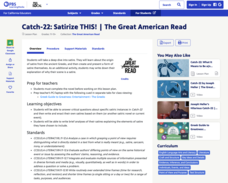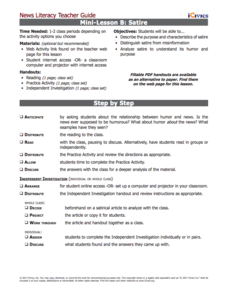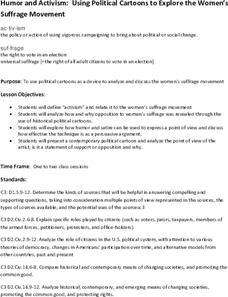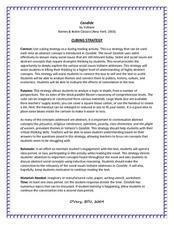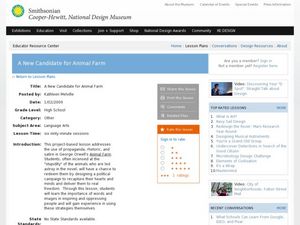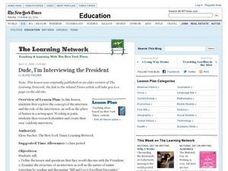PBS
Catch-22: Satirize This!
Some assignments are great, some can become great, and some have greatness thrust upon them. This one is great. After completing Joseph Heller's classic satire, Catch-22, groups craft and present their own political satire.
iCivics
Mini-Lesson B: Satire
Hey, what's so funny? Explore the use of satire in a variety of media with a hands-on lesson. Fourth in a five-part journalism series from iCivics, the activity introduces satirical language in print and online. Pupils work alone or in...
Curated OER
Fighting Fire With Satire
Students consider satire in the news by exploring various sources of "fake news," and then creating their own political satire in the form of a skit, news article, or cartoon.
iCivics
Mini-Lesson: Presidential Succession
Who is in line for the presidency? Learners research the line of succession in the executive branch. They analyze the role the cabinet plays in a situation where the president and vice president are not able to serve. Along the way,...
Curated OER
Comedy Across the Curriculum
The New York Times Learning Network provides the resources that permit pupils to examine and then write and perform a fake news broadcast in the vein of “The Daily Show” or “Saturday Night Live” Weekend Update. The generated reports...
Curated OER
Literary Newspaper: Candide
Prejudice? Religious intolerance? Political sedition? Class distinction? Plight of women? Voltaire satire, anyone? A literary newspaper offers an opportunity for readers of Candide to make text-to-self and text-to-world connections as...
Curated OER
Satire in Fiction
Twelfth graders identify satire in various fictional texts. In this language arts lesson plan, 12th graders will learn to define satire, parody, and caricature. Students will identify different forms of satire in historical and...
Curated OER
Redistricting: Drawing the Lines
Difficult redistricting concepts are covered in a context that will make it understandable to your government scholars. They begin with a KWL on the term redistricting and then watch a video to answer some questions. They analyze...
National Woman's History Museum
Humor and Activism
As part of their study of the women's suffrage movement, groups analyze political cartoons and drawings. They create a caption for an image from the time, add an exhibit label that provides a context for their drawing, and post as part...
Curated OER
Candide Cubing Strategy
Candide is a dense text. To assist in analyzing Voltaire's satire, groups employ a cubing strategy based on Bloom's taxonomy. Complete directions for the strategy, a template for the cube, a worksheet, and a topic list are included.
Council for Economic Education
Jokes, Quotations, and Cartoons in Economics
Humor offers a great tool teach the basics of economics to scholars via video clips, satire, and political cartoons. Individuals create their own economic humor to present to the class—with the assistance of Daryl Cagel's online...
Curated OER
Mark Twain: Straddling the Civil War
Mark Twain's life, politics, writing, and role as a mirror of pre- and post-Civil War American culture are the focus 11th and 12th graders in this section from an expansive author study. A critical writing assignment comparing Twain to...
Curated OER
A New Candidate for Animal Farm
Students create an advertising campaign in which a candidate from Animal Farm will run for an upcoming election. In this follow-up activity to George Orwell's Animal Farm lesson, students explore propaganda, rhetoric, and satire as they...
National Endowment for the Humanities
Nathaniel Hawthorne and Literary Humor
Young scholars examine Nathaniel Hawthorne's style of humor and compare it to other humorists. They discuss the purpose of literary humor and determine how it develops characters and plots in stories. They analyze the use of different...
Dream of a Nation
Writing a Narrative Essay
Imagine using narrative essays to encourage change. This multi-week unit plan does just that. After reading a series of articles from Tyson Miller's Dream of a Nation: Inspiring Ideas for a Better America, class members examine the...
What So Proudly We Hail
A Lesson on Benjamin Franklin’s “Project for Moral Perfection”
Benjamin Franklin identified 13 virtues that he felt would strengthen his character if he could focus on each one. A thorough lesson plan explores high schoolers' personal values in the context of their lives, and compels them to strive...
Curated OER
Dude, I'm Interviewing the President
Student define issues and questions they would discuss with a president. Learners read "Bill and Leo's Excellent Encounter". Students choose famous personalities, research their celebrity, and create a mock interview with them.
Curated OER
Unit Plan for Mark Twain and American Humor
Students create brochures about the humor of Mark Twain. In this literature-analysis lesson plan, students read "The Celebrated Jumping Frog of Calaveras County" and other short stories by Twain. Students write analytical paragraphs and...


